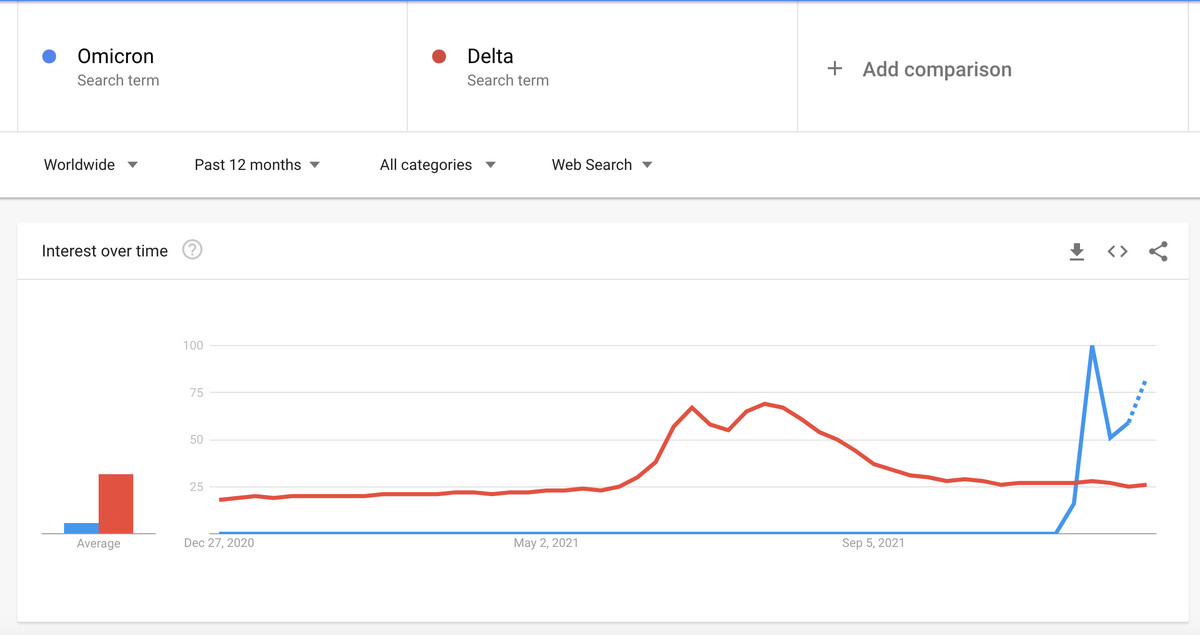At the same time that omicron was quickly overtaking delta to be the dominant strain of Covid-19 in the US and many other countries, it’s also spread on social media.
People are posting about the omicron variant significantly more than they posted about the delta variant over a similar timeframe, according to an exclusive report for Recode gathered by media intelligence company Zignal Labs.
Compared to delta, omicron was mentioned around six times more often on Twitter, Facebook, Instagram, and Reddit in the three weeks after each strain was first identified by the WHO by name as being variants of concern. In the three weeks after each strain was identified by the CDC as a variant of concern (which came later than the WHO), omicron was mentioned 2.2 times more often across the same social media channels.
“People are talking more, and more quickly, about omicron than they were about delta,” said Jennifer Granston, chief customer officer and head of insights at Zignal Labs. “It happened really, really fast.”
There are also signs that people are not only posting more but seeking more information about omicron than delta. On Google, the rate of searches for “omicron” has already far surpassed those for “delta” at its peak earlier this year by around 1.5 times as much, according to Google Trends.

Social media analysts offered some potential explanations for this uptick: The virus is spreading more quickly than the delta variant did, which means more people are turning to social media to ask questions and share their concerns; and people are more comfortable publicly disclosing their Covid-19 status than they were earlier in the pandemic, so they’re sharing their test results online.
Omicron also lends itself to more discussion “purely from a meme perspective,” said Amanda Brennan, senior director of trends at the social media agency XX Artists and formerly a “meme librarian” at Tumblr.
Brennan described the prevalence of a kind of “defeatist vibe” and “gallows humor” in the memes she’s followed about omicron that’s “in a much deeper way than delta was.” While people are fed up with a seemingly never-ending cycle of contagion; they also may be more willing to joke about it now that the virus is better understood.
Then there’s the New York media effect.
Since late November when omicron first became a variant of concern, around 2 percent of all tweets about the variant also mentioned New York, according to Zignal Labs. The proliferation of journalists, influencers, and other media types with large followings posting about the variant has helped omicron earn the moniker “the media variant.” Many New Yorkers on social media have posted images that have gone viral showing people lined up around city blocks to get a Covid-19 test, or TikTok compilations of screenshots from their group texts showing friends alerting each other of their Covid-19 statuses set to blaring pop music.
Despite the New York hype, many of the most-shared tweets mentioning omicron so far have been not from New York City, but from outside the US, according to Zignal. The most-shared tweet as of December 17, according to Zignal, is written in Thai, warning people to take omicron seriously.
Overall, increased and early talk about omicron on social media can be both a good and a bad thing. On the one hand, early conversations about omicron could serve as a warning to the public to be more cautious as this highly contagious variant begins spreading.
But the onslaught of social media chatter can also provide an opening for misinformation about the variant to enter the online discourse, which has been a recurring problem since the pandemic began in early 2020.
“One thing that we tend to try to really watch for is particular agendas or objectives being furthered because when you have these huge discussions and so many eyeballs, it’s very easy for people to inject a message,” said Zignal Labs’ Granston.
As we end 2021 facing this new omicron wave, in many ways it feels like we’ve regressed back to 2020’s holiday spike. As people grapple with this feeling of deja vu, it makes sense that they’re talking more online, trying to understand how to adapt to the ever-changing new normal.
This story was first published in the Recode newsletter. Sign up here so you don’t miss the next one!